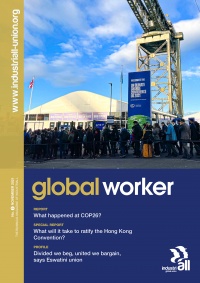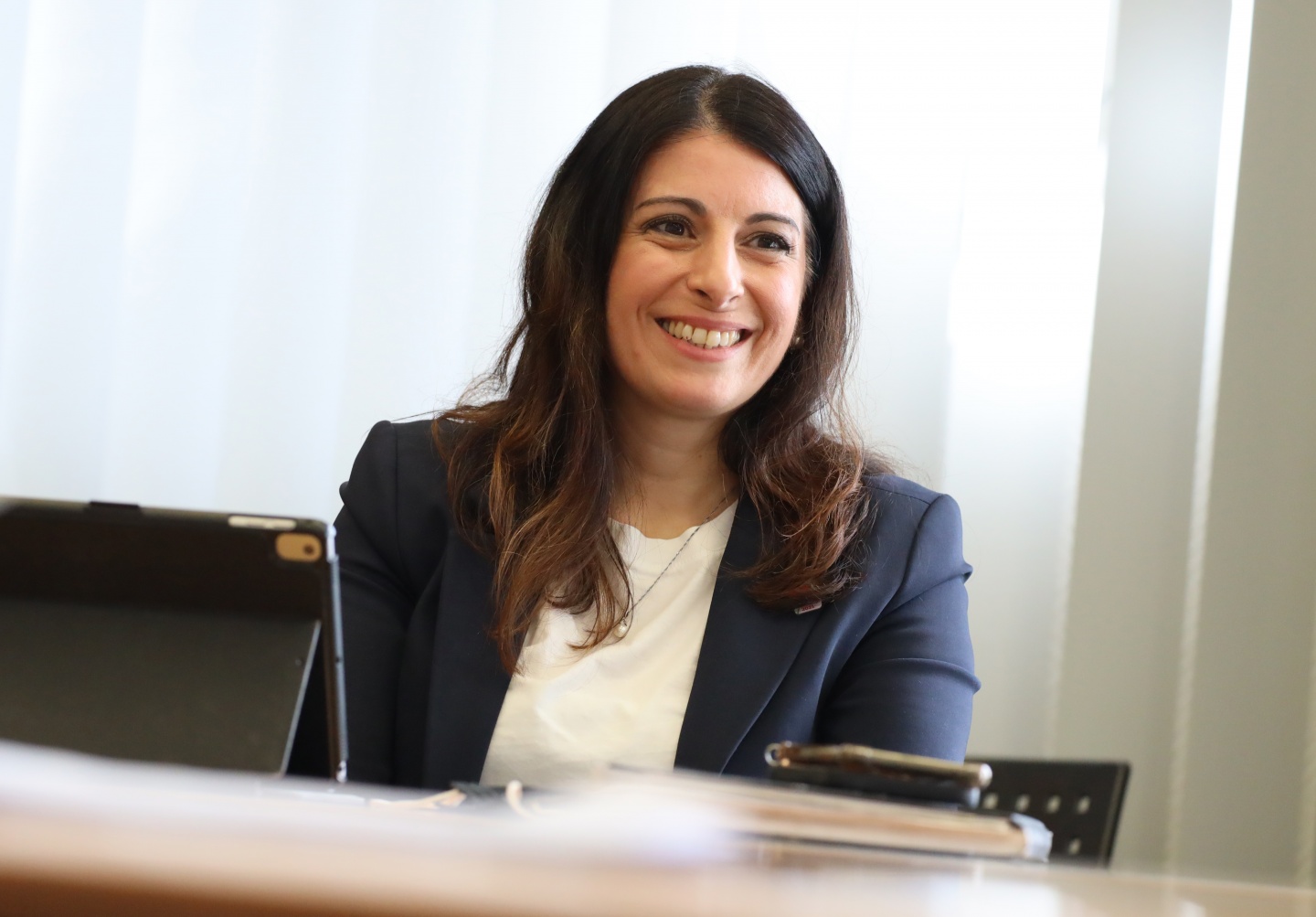10 February, 2022Daniela Cavallo, president of the European and World Group Works Councils of Volkswagen, the largest global automotive manufacturer with more than 600,000 employees worldwide, has incredible power concentrated in her hands.
INTERVIEW From Global Worker No. 2 November 2021 | |
 | Who: Daniela Cavallo Text: Alexander Ivanou |
Daniela Cavallo, the daughter of an Italian immigrant who came to Germany in search of a better life and worked at Volkswagen in Wolfsburg, also started working at Volkswagen more than 27 years ago. Now, she is the chair of the works council of the largest plant in Wolfsburg, chair of the national works council in Germany, and president of the European and World Group Works Councils of Volkswagen. Daniela is also a member of the company’s supervisory board, in addition to other responsibilities in the complex world of Volkswagen.
Daniela’s extensive experience in the company brings a lot to her position. Throughout the years she has witnessed many developments, both favourable ones, but also some critical. She has worked in different roles; starting as an apprentice in office administration to a works council member in the “Auto 5000” subsidiary, a project established to secure new jobs and investments in VW in Germany while accepting lower wages and more flexible working times. There she also participated in the negotiation of collective agreements.
Over the years Daniela has represented different groups of employees and has gained a lot of experience. Her work has allowed her to build a huge network, not only among the workers but also on the management side at different levels, which helps her in her current position.
Daniela believes one of her strengths is her ability to work with different people.
“I’m a good team player and I always look for solutions. People may have different opinions and it is important to accept that, to have discussions even when there is a controversy and always search for solutions.”
Daniela considers herself too impatient sometimes and prefers making things change rapidly. In a way this is an advantage, as it helps her to continue insisting and eventually achieving the results, but others may consider it as being too pushy.
Although excited when elected president of the works council, Daniela did not have a lot of time to think about it.
“I was immediately thrown into the deep end.”
In the beginning, there was a bit of “let’s wait and see” attitude towards here, which Daniela does not link to her being a woman.
“I had already worked with many of my colleagues for years. However, I did notice that during meetings, discussions and appointments, the higher you are in the hierarchy the less women you see.”
Since 2002, works councils in Germany have a quota for women and as a result there are more women present.
“How things are discussed, the way you work and how you search for solutions change when there are more women present, and this is enriching.”
While this remains an important part of her daily work, Daniela’s main focus is on the changes taking place in Volkswagen affecting current and future jobs.
The auto industry is going through a deep and comprehensive transformation towards electro vehicles and new mobility concepts. This transformation means changes in the work, leading to potential job losses due to digitalization and technological changes, but also to opportunities of new jobs in new areas. In 2016, VW Management and the General Works Council signed a pact for the future. Signing the pact meant – although managed in a socially responsible way – drastic job losses and setting up a new system with a shift to new tasks and jobs with a budget for qualification and upskilling.
“We had presented the elements of the pact for the future, and although we had to make some compromises, in return we received from management the guarantees to secure jobs,”
says Daniela.
With a digital transformation roadmap, the focus was on the indirect areas, meaning those jobs not directly linked to manufacturing. With the adopted roadmap, Volkswagen pledged to invest in creation of new jobs related to digitalization mainly in IT.
One of the examples for upskilling is the Faculty 73 program. Through this, Volkswagen trains software developers and upon successful completion offers them permanent employment. The remarkable thing about this is that workers from the assembly line can also join the project if they show talent for IT related matters. A similar concept now has also been implemented at SEAT in Spain.
Volkswagen is a pioneer when it comes to transnational cooperation and global bodies of employee representatives. Global charters like the Social Charter, Charter on temporary work, Charter on training and education etc. were implemented and allowed unions in other VW plants around the world to benefit from the strong co-determination rights in Germany and in VW.
Germany has a legal basis for a system of co-determination and co-decision culture in the workplace. This means cooperation between management and workers in decision-making, among others by the representation of workers on supervisory boards.
VW’s policy charters are unique and an important contribution to the protection of workers’ rights globally. These charters can also be the basis for implementing minimum rights in countries where workers face insufficient respect of their rights.
“Consultation and information rights in different countries are an important topic of exchange. These exchanges can help, but if the company does not take the claims seriously, I have to support the workers concerned. The different charters can contribute to the process and help to implement co-determination and co-decision processes, not only on the employees’ and unions’ side, but also on the management side.”
The Covid-19 pandemic has brought a wide discussion on what kind of social protection measures can be put in place. Daniela recalls about complaints from colleagues abroad over the reduced time of work. The broad footprint of the VW Group in Germany and related agreements between the company and the works council has often helped to safeguard jobs, not only during the pandemic:
"In Germany, staff from Volkswagen was sent to Porsche, or from Audi to VW Sachsen, while at plants in other countries, like at VW and Audi in Mexico, there was very little exchange. Two plants did not really support each other in difficult situations and each plant struggled on their own with their problems",
says Daniela.

Agreements between the Volkswagen Group & the European/Global Group Works Councils
Daniela believes that IndustriALL’s participation in the international charters is very important, referring also to the case of Volkswagen’s only unorganized plant, the one in Chattanooga, Tennessee, USA.
IndustriALL affiliate, the United Autoworkers (UAW), tried to organize the plant in 2014 and 2019. Both times, the company enlisted a company to help with union busting in order prevent UAW from winning the union elections. IndustriALL even suspended the global framework agreement with Volkswagen.
Influence of politicians, both on state and federal levels, clearly played a role during the elections in Chattanooga. Daniela admits the complexity of the topic and continues her consultations with UAW. She pledges her support to organizing the plant and believes the current situation in the US with the new president can bring changes,
“It is a new game and maybe this is a moment for new collaborations. There are lots of different factors and facets. I can’t promise my arrival will change everything; I can only promise that I will do everything I can,”
says Daniela.
Developing the charters continues and new topics are added. Currently, the VW works council is working on a new Charter on Digital Responsibility, which will define certain principles based on how digitalization impacts employees and what consequences it brings for the workforce.
“This is something we continue to address; it is part of the company culture,”
says Daniela.
Company investment strategy is also on the agenda.
“It is crucial for employees’ representatives to have influence on sourcing and investment decisions in VW, and not only in Germany. Without this possibility, we would be reduced to mere caretakers”,
Daniela concludes.
PHOTOS: by Kevin Nobs and Carsten Heidmann


